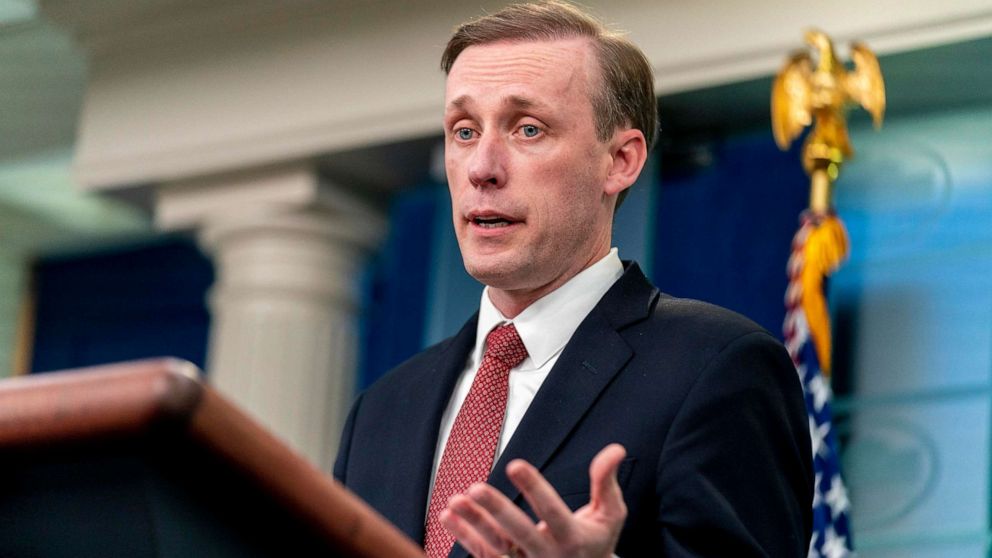Russia 'planned' attacks on Ukrainian civilians: National security adviser Sullivan
National security adviser Jake Sullivan said the latest reports of Ukrainian civilians being tortured and killed by Russian troops have been "horrifying...downright shocking, but they have not been surprising."
Sullivan told ABC News "This Week" Co-Anchor Jonathan Karl on Sunday that before the war began, declassified intelligence "indicated that there was a plan from the highest levels of the Russian government to target civilians who oppose the invasion."
"So this is something that was planned," he told Karl, adding that some units may have acted without direction from their leaders, frustrated by the level of opposition they've encountered from Ukrainians.
"I do think some of these units engaged in these acts of brutality, these atrocities, these war crimes, even without direction from above. But make no mistake, the larger issue of broad-scale war crimes and atrocities in Ukraine lies at the feet of the Kremlin and lies at the feet of the Russian president," he said.
When asked if the acts amounted to genocide as suggested by United Kingdom Prime Minister Boris Johnson, who visited Ukrainian President Volodymyr Zelenskyy in Kyiv this week, Sullivan noted that the State Department usually makes that legal determination after an investigation and legal analysis.
"But let's set legalities aside for a minute...I think we can all say that these are mass atrocities. These are war crimes," he said.
In one of the latest incidents, at least 52 people, including five children, were killed during a missile strike at a train station in eastern Ukraine. Images of bodies strewn across luggage showed the magnitude of the attack, which injured at least 100.
Since the war began, the Biden administration has been steadily implementing sanctions meant to cripple the Russian economy and Putin's funding of the invasion.
In the latest package, the U.S., in conjunction with its European Union and G-7 allies, imposed a ban on all new investments in Russia, increased sanctions on two major banks and sanctioned Russian President Vladimir Putin's two adult daughters. But while the U.S. has banned Russian oil imports, European governments have not.
Asked if it was time for Europe to ban Russian oil and gas and imports, which come to an estimated $850 million per day, Sullivan said the president had been clear that the U.S. was able to do so "without imposing massive costs on the American people" but would continue to work with European allies to limit dependency.
"He is now working on a daily basis with his European colleagues on steps Europe can take to wean itself off of Russian oil and gas," he told Karl. "In fact, the United States is surging gas exports to Europe in order for them to reduce their dependence on Russia."
Karl followed up: "But you hear the frustration from President Zelenskyy. We heard it from the mayor of Kyiv that the money continues to flow, that the ruble is not in rubble as the president said...The money is still flowing and flowing in pretty dramatic levels."
"If you look at independent projections of the Russian economy, it is likely to fall by something like 10 to 15% this year," Sullivan said. "It is likely to cease to be one of the world's major economies because of the economic pressure we have put on them."
Sullivan also said the economy is being "artificially propped up" by Russian banks.
"Banks…are not allowed by the Russian government to sell dollars to customers. That's how they're protecting the ruble. But that has huge economic costs on the -- on the Russian economy," he added. "We will continue to squeeze the Russian economy so that Russia and the Kremlin feel the pain from what they have done in Ukraine."
Sullivan conceded that although Putin has suffered several setbacks in his mission to topple the Ukrainian government, his tight grip on media has prevented Russians from hearing the truth.
"They are not getting the truth, for example, Jon, about the fact that the Russians lost and the Ukrainians won the battle for Kyiv," he said. "Kyiv stands despite Russia's effort to conquer the capital city of their neighbor and they were unable to do that, and they suffered a significant military defeat there."




